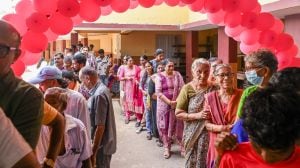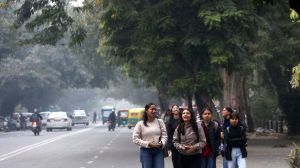THE creation of Ladakh as a Union territory separate from Jammu and Kashmir had been fulfillment of a long-standing demand by people of Leh. Three years later, with their hopes of other promises flowing from it not materialising, protests are being staged – in both Leh and Kargil regions – seeking statehood as well as extension of the Sixth Schedule of the Constitution to Ladakh, guaranteeing it special rights.
Often at loggerheads, the Muslim-dominated Kargil and the Buddhist-dominated Leh, find themselves on the same side on the demands, and have formed a joint core committee to decide their future strategy.

At the forefront of the statehood call in Ladakh is the Ladakh Buddhist Association (LBA), which is part of the ‘Apex Body of Leh’, an alliance of political parties active in Leh barring the BJP. Earlier, the LBA had helped the BJP gain a foothold in the region after the party promised – and then came through on it – on the region’s demand for a separate Union territory or autonomous status for Ladakh. However, the BJP, which now governs Leh through the Ladakh Autonomous Hill Development Council (LAHDC), Leh, has distanced itself from the LBA’s demand for statehood for Ladakh.
In Kargil, the statehood struggle is led by the Kargil Democratic Alliance (KDA), an alliance of religious, social and political organisations. The Ladakh Autonomous Hill Development Council, Kargil, is led by the National Conference, and was earlier supported by the Congress.
While Kargil has long felt suppressed by the “hegemony” of Leh – just like Ladakh used to complain about the same regarding Kashmir – the dividing lines between the two districts are fading in the wake of separation from J&K and the developments since.
Realising the gravity of the developing situation, the Union Home Ministry constituted a team under Minister of State, Home, G Kishan Reddy a year ago to initiate dialogue with the people of Ladakh. But there has been no forward movement.
Saying their two basic demands are statehood for Ladakh and special status under the Sixth Schedule, LBA vice-president Lakruk Chering says: “We will decide our future strategy together with the people of Kargil. The core committee will meet and decide what to do next.”
Story continues below this ad
Sajad Hussain, a political leader from Kargil and member of the core committee formed by the KDA and LBA, says: “We are united in our demand for statehood. We live in a demographically sensitive zone. There should be some safeguards for our rights.”
Chering adds that after the Centre reached out for talks, they forwarded the names of their representatives to it. “But there has been no movement since. We have not been invited for talks so far.”
The Sixth Schedule under Article 244 provides for the formation of autonomous administrative divisions that have some legislative, judicial and administrative autonomy within a state. In September 2019, the National Commission for Scheduled Tribes recommended the inclusion of Ladakh under the Sixth Schedule, noting that the new UT was predominantly tribal (more than 97%), people from other parts of the country had been restricted from purchasing or acquiring land there, and that its distinct cultural heritage needed preservation.
Incidentally, in 2019, BJP MP from Ladakh Jamyang Tsering Namgyal also demanded that the region be included in the Sixth Schedule of the Constitution to safeguard the land, employment, and cultural identity of the local population, while speaking in Parliament.
Story continues below this ad
Besides statehood and demographic safeguards, Ladakh also wants representation in Parliament. When J&K’s special status was abrogated in 2019 and the state downgraded to two Union territories, Ladakh was made a Union territory without a legislature. Leaders say that in the absence of political supervision, bureaucrats now run the show in the two autonomous and powerful development councils for Leh and Kargil.
Hussain says that “there are no business rules to govern the Ladakh Union territory”. “We have places where we have hill councils but no Union territory, and places where we have a Union territory but no hill council. Ladakh is a unique example where we have both. The mandate and jurisdiction of the hill councils have not been defined, so it is not clear whether the secretaries are under the elected executive councillors, or the executive councillors are under the hill council.”
The Kargil leader adds: “Here, we have more security and protocol for bureaucrats than secretaries. It seems it is a Union territory of the bureaucrats, by the bureaucrats and for the bureaucrats”.
The BJP claims it stands with the aspirations of the people of Ladakh, asks why it has been kept out of the Apex Body of Leh, which it accuses of delaying talks with the Centre. “We are not against any demand but we want debate and discussion on what is good for us and what is not. We need to discuss if we can run a state or need hand holding by the Centre,” says BJP leader Tashi Gyalson, who is the Chief Executive Councillor of the LAHDC, Leh, adding: “Ultimately, every UT is converted into a state. We need to have patience.”
Story continues below this ad

On talks with the Centre, Gyalson says: “We had a meeting with the minister. Those who participated put forward their viewpoints. But their viewpoints, their demands keep changing… first Constitutional safeguards, then Sixth Schedule, then UT with a legislature, and now statehood. The Central government is also confused.”
The LBA’s Chering says the BJP is “lying through its teeth”. “These are just excuses. Whenever and whatever the demand is, the decision would be taken on a discussion table. They are not ready to come to the table. How can there be any decision?”


































